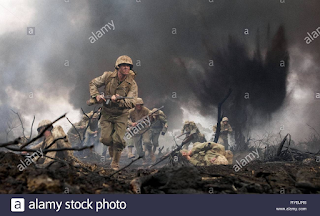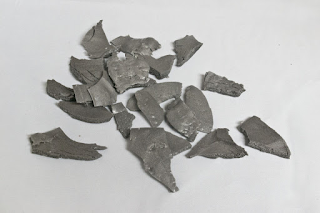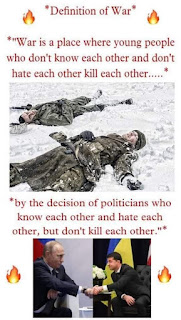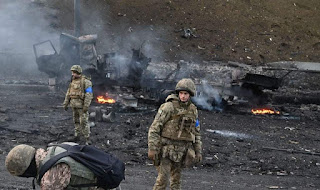Summary of PoemThe Gift in Wartime : By Tran Mong Tu
The Gift in Wartime
[ Summary, Analysis, Interpretation, and Important Questions - Answers]
A Short Summary :
This a war poem. In it we find a woman mourning the death of her husband. He was in war, and lost his life in war field.
She talks about gifts which they gave each other. Her gifts were things like rose on his grave, her wedding gown, her youth. In return, she received gifts like his medals, badges, his dead body, shrapnel, his blood stained uniform.
A second thought on his gifts makes it clear that such gifts are not from the husband. No husband can send such deadly gifts to his wife. These are gifts from 'war' itself. These are war's gifts not only to this woman, but to all those who lose their people in war.
Wars are not only terrible to widows or war survivors, but they are terrible to whole of the humanity.
--------------------------------------------------------------
Summary :
The Gift in Wartime is a war poem which tells us the saddening, gloomy effects of war on the family members who have lost their near and dear ones in war. It focuses on the differences in their lives after they have lost them. Here we find heart wrenching feelings of the speaker who has lost her husband in war.
(Battle Field)
The poem is written in a dramatic monologue form, where the speaker (a widow) addresses an unknown "you", who is in fact her (dead) husband.
On the surface level it is only an account what gifts she gave to her husband, and in return what he gave her.
She has offered rose on his grave and has covered it with her wedding gown. She has offered him her youth, her prime time, her love, and pleasant spring.
(Rose on Grave)
In return, the husband's gifts are: his medals, badges, his uniform (war dress), stained with his blood and smell of his enemy's blood.
He is dead now, so his dead body also has been a gift to her.
She ends her saying hopefully to meet him in their next life. She will keep the shrapnel as a token, which will help them know and recognize each other in next life.
(Shrapnel : Little pieces of bomb)
When we analyze the different images, (the gifts exchanged), we feel how lonely and helpless she feels when her husband has gone. All the pleasures and charms of her life have gone with the man leaving the world.
--------------------------------------------------------------
Questions-Answers
Before Reading
Answer these questions:
a. Have you ever experienced the death of someone close to you ? If yes, how did you feel ?
Answer: Yes, I have experienced the death of my mother. She had been suffering from several days. That day, her condition got more critical. We had to take her to hospital immediately. We called an ambulance. She was unconscious. Her head was on my lap. Suddenly there was a silence. We realized that she was no more.
It was such a heart wrenching experience for me. Although she was in my lap, I could not stop her from going far far away, leaving us!
b. Is war always destructive ?
Answer : Yes, wars are always destructive. They always have a severe and bitter effect not only on people, but also on the economy of countries, and environment. Soldiers lose their lives, leaving behind their family members helpless making their lives barren.
The economy of the countries breakdown resulting in hunger and unemployment. It has disastrous effects on nature and our life styles. Some long term effects of war are poisoned water supply, chemical intoxicants in our environment etc.
--------------------------------------------------------------
Understanding the text:
Answer the following questions:
a. Question: Who is the speaker addressing and why can that person not hear or understand what she is saying ?
Answer: : The speaker is addressing her husband. But he can not hear her because he is not alive. He has lost his life in the war field.
b. Question: What can you infer about the speaker's feelings for the person addressed as "you" ?
Answer : Her feelings for that person is full of love, affection and devotion. She has gifted him her prime youth (Spring) and all the pleasures of life. She is saddened by his death. Although he is no more in the world, she is still hopeful to meet him in their next life.
c. Question : What is the speaker's attitude towards war ?
Answer : The speaker's attitude towards war is very bitter and full of sadness.
d. Question : In what ways do you think this person's fate has affected the speaker ?
Answer : This person (speaker's husband) became a victim of ill fate. He lost his life in battle life. Naturally, this has affected the speaker very badly. She has lost her husband. All the charms of her life have gone. She has now been all alone in this world.
e. Question : What does the speaker promise at the end of the poem ? Why do you think the speaker does this ?
Answer : The speaker promises her dead husband to meet in their next life. She has also kept his shrapnel as a token to recognize each other. She promises because of her deep and honest love for him.
-------------------------------------------------------------
Reference to the context:
a. Question : What is the theme of the poem ?
Answer : The major theme of this poem is her memory and mourning for her husband. This is also about the futility of lives lost in war.
b. Question : What imagery from the poem made the greatest impression on and why ?
Answer : The poet has used several powerful images in this poem.
Among them all, I liked the shrapnel image the most. It made it very clear what gift a war can give to human beings. The shrapnel does not only mean that it shattered the body of the soldier, but also shattered the life of the beloved. That is the deadly gift of the war.
c. Question : Which figurative language is used in this poem ? Explain with example.
Answer : The poet has used several figurative languages in this poem. They are : 1. Anaphora, 2. Apostrophe, 3. Metaphor, 4. Irony etc.
1. Anaphora : Anaphora is the repetition of the same words or phrases at the beginning of a line. For example : "I offer you" is repeated in paragraph one, three, and five. "You give me" is also repeated in para second, fourth, and fifth paragraphs.
2. Apostrophe :It is a direct address to a person who is not present. For example, the speaker is addressing her husband, who is dead.
3. Metaphor : A metaphor is a figure of speech that is used to make a comparison between two things that are not alike, but have something in common. For example, in this poem the speaker compares her sadness to the clouds in her eyes on a summer day.
4. Irony: Irony takes place when the words mean opposite of their intended meaning. In this poem, when the speaker talks about gifts in war time, she is not speaking of a real gift, but of grief and loss. A grave or a shrapnel can never be gifts people would like or want. In fact such are the gifts of war and death.
d. Question : What does the speaker "offer" in this poem ? What does the person addressed as "you" give in return ?
Answer : The speaker offers rose, her wedding gown, her youth and spring time to him.
On the other hand, he gives her his medals, badges, his yellow pips, his blood stained dress, his motionless body and shrapnel.
e. Question : An apostrophe is a literary device in which a writer or speaker addresses an absent person or an abstract idea in such a way as if it were present and can understand. Discuss the poem in relation to apostrophe.
Answer : The speaker addresses her dead husband directly, that is apostrophe. This way has helped her to express her feelings and grief to him directly. This makes it a personal poem. This helps her to lighten her heart. By addressing the absent "you", she has also been able to give him the message and promise to meet him in the next life.
--------------------------------------------------------------
Reference beyond the text
a. Question : One way to get relief from grief is to write or talk about it. In your opinion, how might the speaker in this poem has benefitted from saying what she did ? Explain.
Answer : The death of some near and dear one can have a very devastating effect on anybody. This can take one into its grip for months or years.
In such a situation writing can help one to come out of such situation. Writing in grief helps the grief release and thus making heart lighter. Writing boosts the immune system and increases mental health.
The speaker has benefitted most by writing a poem about her dead husband. She feels better because she feels she has been talking to him face to face. Promising to meet him in their next life lightens her heart.
b. Question : Write an essay on the effects of war.
Or
Write an essay on "War never brings good".
Answer : There can be no two opinions about effects of war. War has only and only devastating effects on the people who die in battle fields, the people who lose their family members, on the economy and on the entire environment .
War effects can be long term and short effects. War destroys families and communities. War disrupts the developments of the social and economic sides of the countries.
While talking about the effects of war, people only think and talk about deaths. But that is only a short view about the matter. The other horrible sides of it are : spread of different diseases, lack of food, malnutrition, disability, economic and social decline etc.
The effects of war are both physical and psychological. War brings untold miseries.
In conclusion, War can never bring good to humans, it brings only and only death and destruction.
--------------------------------------------------------------
Analysis and Interpretation of the Poem:
1. Theme of the poem:
- Memory of her dead husband
- Mourning the sadness and futility of lives lost in war
- Terrible tragedies of war
2. Type of the poem: It is a lyrical poem, presented in the form of 'dramatic monologue'.
3. Context of the poem: It is war poem, written in the context of a conflict between Communist regime of North Vietnam and Southern allies, which began in 1954 and ended in 1975.
4. Speaker of the poem: The speaker of this poem is a heart broken wife whose husband has lost his life in battle field.
5. Addressee of the poem (to whom she speaks): The dead husband of the woman.
6. Mood: The poem is written in a sad and melancholy mood.
7. Tone: The poem is written in a blue, depressing and heart broken tone.
8. Structure of the poem:
- There are seven stanzas
- Every stanza consists of four lines
- Every other stanza starts with "I offer" and "You give me"
- Every line starts with a capital letter
- The poem follows a particular pattern. Their gifts are mentioned in alternative paragraphs. For example, in paragraph one, three, and five she talks about the gifts she gave him. On the other hand, in paragraphs two, four and six, she talks about the gifts her husband gave her:
In the last paragraph she promises to meet him again in their next life.
9. Their Gifts: Speaker's gifts to her husband are -- rose, her wedding gown, her youth and the prime time of her life.
Whereas, his gifts to her are his death, his grave, his medals, shrapnel and his blood-stained dress.
10. A Contrast Between Their Gifts: There is a big contrast between their gifts. Her gifts, like rose, wedding gown, her youth, all relate to charms and pleasurers and positive aspects of life.
On the other hand, his gifts like, grave, medals, dead body, blood-stained dress, shrapnel etc. are related to the dark side of life. They are 'empty gifts of death' after all.
11. Hopeful Ending: The best aspect of this poem is the hopeful positive ending. Although her heart is shattered into pieces by his death, she is still hopeful to meet him in their next life. This shows her deep love and devotion to him.
12. The Message: The clear message of this poem is that war can never bring happiness. It only leads to ruins, death and destruction.
13. Major Literary Devices Used in This Poem: The poet has used many literary devices in this poem. They are : Anaphora, Apostrophe, Metaphor, Irony, Imagery, etc.
- Anaphora: Anaphora is the repetition of words or phrases in a group of sentences clauses or poetic lines, at the beginning of such structures. For example, in this poem, the first, third, and fifth stanzas start with phrase 'I offer you', and second, fourth and sixth stanzas start with 'You give me'.
- Apostrophe: It is the direct address to a person who is not present or to an inanimate object. For example, in this poem we find the addressing her dead husband.
- Metaphor: A metaphor is a figure of speech that is used to make a comparison between two things that are not alike, but have something in common. For example, in this poem the speaker compares her sadness to the clouds in her eyes on a summer day.
- Irony: Irony takes place when the words mean opposite of their intended meaning. In this poem, when the speaker talks about gifts in war time, she is not speaking of a real gift, but of grief and loss. A grave or a shrapnel can never be gifts people would like or want. In fact such are the gifts of war and death.
- Imagery: Imagery is a vivid form of description that appeals to reader's senses. It creates pictures or images in the reader's mind. Some important imageries used in poem are: roses, motionless body, eyes with no sight, shrapnel, etc.
-----------------------------------------------------------------------------------
(All images credit: Google Images / Last image source: Facebook Screen Shot)
----------------------------------------------------------------------------------













Thanks for sharing..
ReplyDeleteYou are always welcome to the blog
DeleteEasy to understand the Concept..
ReplyDeleteEasy language to understand. The pictures also help in understand
ReplyDeleteNice material. Some word meanings will make it more helpful
ReplyDeleteMaking understandable, providing every minute details with vivid descriptions needed to understand poetry. Thank you 🙏
ReplyDeleteGreat poem with great illustration
ReplyDeletegreat artcle
ReplyDeleteawesome
ReplyDeleteawesome
ReplyDeletegreat article
ReplyDeleteAmazing 😍
ReplyDeleteThank you sir for allowing me to go through this story. The exchange of gifts are obviously contrast to each other. I feel their should be bouquet of roses or something else form both sides but certainly not shrapnel, bloodstained clothes. Thank you sir making things so simple to understand and it is still relevant to today.
ReplyDelete